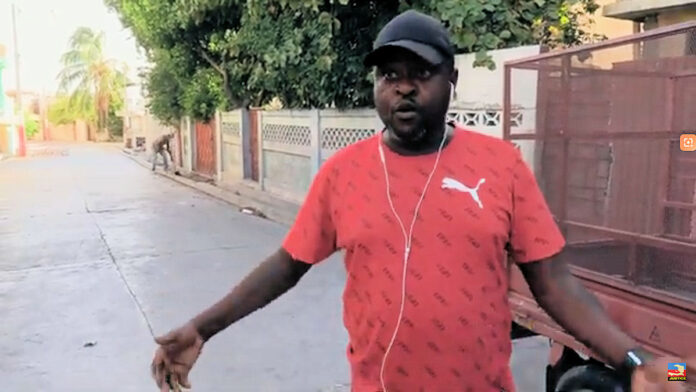
(Français)
Over the first two and a half decades of the 21st century, we have seen the emergence of Haiti’s “gangs,” as the U.S. State Department and mainstream media have perjoratively branded the armed neighborhood groups, both criminal and anti-crime, that all issue from the proletariat and lumpen-proletariat. They have been portrayed as the sole agents of Haiti’s chaos.
Their current control over nearly 90% of the Port-au-Prince metropolitan area (counter-intuitively, most of their neighborhoods are the safest Haiti has ever seen) has torn away the veil of illusion and revealed what many refused to see: the invisible hand choking Haiti’s financial system, economy, politics, and sovereignty.
This hand is not Haitian. It belongs to the oligarchs and the so-called “private sector” — mere intermediaries of U.S. interests. These families have hoarded resources, blocked social mobility, and condemned generations to abandonment and despair. Humanitarian NGOs and “benevolent” institutions have only perpetuated this dependency, shellacking servitude with the veneer of charity.
In reality, the “gangs” — in their raw and existential ferociousness — have revealed the truth: Haiti’s powerful were merely executors of a foreign agenda. The “gangs” have shattered the comfort zone of the oligarchs and their “international partners” i.e. overseers. They showed that power in Haiti has never belonged to the people, but to a handful of families serving foreign forces whose only aim is access, influence, and profit.
So the question arises: what is to be done?

The answer is not to return power to the oligarchs, nor to restore the monopoly of an elite that has thrived on the masses’ misery. The answer lies in transforming the territories controlled by “gangs” into laboratories for a new Haiti. These areas, often seen (inaccurately) as zones of crime, can become spaces of rebirth.
Instead of leaving them closed off to the same small group aligned with Washington, they should become open doors for new investors — from the Global South, the Caribbean, Africa, Asia, and Latin America — actors with no interest in perpetuating dependency or reproducing servitude.
Let these new actors join with Haiti’s poor to build schools, hospitals, training centers, banks, and industries in Cité Soleil, Martissant, Croix-des-Bouquets — precisely where oligarchs and humanitarian actors never invested a single breath of life. These neighborhoods should become enclaves of dignity and prosperity, equal to — or surpassing — Pétion-Ville. In doing so, the elite’s monopoly is broken, opportunities redistributed, and dependency eradicated.
In other words: communities would no longer need to migrate to Pétion-Ville or Laboule; they would have their own infrastructure, services, and dignity. This shift would break the elites’ choke-hold and anchor real development where the State has always failed.
a revolutionary is never crowned in the present. History, not the moment, decides.
We are at an historical juncture where this opportunity is not just a possibility but an imperative. We see the emergence of the BRICS community (so-called after its pioneers, Brazil, Russia, India, China, and South Africa). Now composed of ten nations, with many more clamoring for admission, they are slowly establishing a new world economic order, not beholden to or dependent on the U.S. or Western Europe, with their own currencies, banks, financial networks, and infrastructure. Haiti has every interest to join in this new economic bloc, where the ethos is “win-win,” not subjugation.
Crime is not born in a vacuum: it emerges where there are no schools, jobs, or reliable institutions. By replacing the void with opportunity, “gangs” could accomplish what the State and NGOs have never done: lay tangible foundations for human life — not dictated by hypocritical Christian morality or appeals to compassion, but by the existential need to survive and prosper. Allowing genuine investment is, in this sense, an act of liberation.
Yet it must be understood: a revolutionary is never crowned in the present. True revolutionaries never seek to be loved now. History, not the moment, decides. Seeking popular approval is a waste of time and a betrayal of the objective. Popularity is a mirage; substance endures.
The Haitian State already understands this: it does not seek admiration. It kills, represses, and violates without remorse or shame — and yet, once a “gang” leader is neutralized, public outrage dissipates, the masses applaud, forgetting thousands of civilian victims that the “forces of order” destroyed. This is the brutal logic of power. The masses’ emotions have never mattered in exercising power — what matters are results, persistence, and clarity of vision.
If this illegitimate, illegal, and unconstitutional government and its “brigadier” paramilitaries can kill and wound 76% of this conflict’s civilian victims (UN figures!) from April to June 2025, without remorse, in pursuit of its objectives, then those who claim to resist must understand: power is never about being liked. It is about action. History does not reward those who seek approval; it rewards those who accomplish what must be done.
The poor neighborhood armed groups must cease seeking fleeting validation and focus on structural transformation. The people cheer today, curse tomorrow (and vice versa). Applause is temporary; results are eternal. History records only one thing: accomplishments. Historical heroes are not those who were loved, but those who acted with clarity and determination.
Today, Haiti stands at two paths:
1. The first leads back to the old oligarchs, still U.S. proxies, still monopolizing resources, still sterile.
2. The second — risky, uncertain, challenging — opens new economic doors, diversified non-aligned alliances, and local structures where dignity replaces servitude, and an externally imposed “rules-based order” no longer holds sway.

If the second path is taken, history may one day say: amidst chaos, brutality, and violence, a sovereignty’s seeds were planted. Not because the planters were loved, but because they dared to do what the State, the oligarchs, and their foreign masters never could, and never wanted to do.
History does not care about morality, popularity, or humanitarian benevolence. It only remembers solutions — the ability to turn the impossible into reality.
In short: the “gangs” have already exposed the rot in Haiti’s system. Now, the task is to pivot from uprooting to planting, from destruction to construction, from rage to strategy. By opening their territories to independent investors and refusing the pursuit of approval, they can turn ghettos into engines of renewal.
This is not to say they should not continue to communicate, educate, explain, and work to win over the people, just as all great revolutionary leaders – Mao, Fidel, Cabral, Chavez, etc. – have done. But the process is long and arduous. Subjective change must be accompanied by objective change.
This is how history is written: not by those who sought to be loved, but by those who did what needed to be done, whatever the cost.










[…] (English) […]
[…] de l’impérialisme américain. » Un autre intellectuel haïtien, Kervens Louissaint, souligne que le contrôle exercé par Viv Ansanm sur 90 % de la capitale haïtienne, Port-au-Prince, « a […]